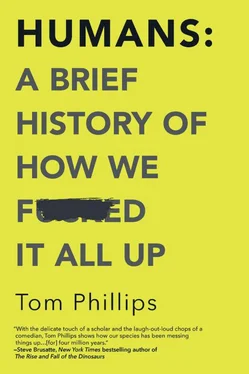Tom Phillips - Humans - A Brief History of How We F*cked It All Up
Здесь есть возможность читать онлайн «Tom Phillips - Humans - A Brief History of How We F*cked It All Up» весь текст электронной книги совершенно бесплатно (целиком полную версию без сокращений). В некоторых случаях можно слушать аудио, скачать через торрент в формате fb2 и присутствует краткое содержание. Город: Toronto, Год выпуска: 2019, ISBN: 2019, Издательство: Hanover Square Press, Жанр: История, Юмористические книги, на английском языке. Описание произведения, (предисловие) а так же отзывы посетителей доступны на портале библиотеки ЛибКат.
- Название:Humans: A Brief History of How We F*cked It All Up
- Автор:
- Издательство:Hanover Square Press
- Жанр:
- Год:2019
- Город:Toronto
- ISBN:978-1-48805-113-5
- Рейтинг книги:4 / 5. Голосов: 1
-
Избранное:Добавить в избранное
- Отзывы:
-
Ваша оценка:
- 80
- 1
- 2
- 3
- 4
- 5
Humans: A Brief History of How We F*cked It All Up: краткое содержание, описание и аннотация
Предлагаем к чтению аннотацию, описание, краткое содержание или предисловие (зависит от того, что написал сам автор книги «Humans: A Brief History of How We F*cked It All Up»). Если вы не нашли необходимую информацию о книге — напишите в комментариях, мы постараемся отыскать её.
Humans: A Brief History of How We F*cked It All Up — читать онлайн бесплатно полную книгу (весь текст) целиком
Ниже представлен текст книги, разбитый по страницам. Система сохранения места последней прочитанной страницы, позволяет с удобством читать онлайн бесплатно книгу «Humans: A Brief History of How We F*cked It All Up», без необходимости каждый раз заново искать на чём Вы остановились. Поставьте закладку, и сможете в любой момент перейти на страницу, на которой закончили чтение.
Интервал:
Закладка:
And so it was that Genghis sent out his first trade mission to Khwarezm, backed with his own funds and led by his personal envoy: 450 merchants, 100 troops and 500 camels, with wagons loaded with silver and silk and jade. Their aim was, in the first place, to ensure that Khwarezm’s recent embargo on trade across the border with the Mongol Empire was at an end. Everybody was extremely keen for this to happen, especially beyond Khwarezm’s borders: Genghis’s unification of northern China had made passage along the Silk Road theoretically much easier, and merchants across the Islamic world were superkeen on a chance to crack the Chinese market. But the shah’s territorial pissiness had closed the route off. As such, when the caravan of merchants and goods entered the northern Khwarezmian city of Otrar in 1218, it must have seemed like good times were here again.
This is where it all went very, very wrong, for a very large part of the world.
Instead of welcoming the trade mission, letting them park their camels and offering them a nice cup of tea, Inalchuq Qayir-Khan, the governor of Otrar, took a different approach. He had them all killed and stole everything they had brought with them. It was a vicious surprise attack, in which only one person out of the 550 in the party survived, because he was having a bath at the time of the massacre and managed to hide behind the tub.
The incident shocked the world, as an outrage against decency and hospitality and also basic common sense. The explanation given by Inalchuq—that he suspected the entire party of being spies—was completely ludicrous. The merchants themselves weren’t even Mongols, instead being largely Muslims from the Uighur region. The prospect that Islamic merchants in an Islamic city on a major trade route were now at risk of being massacred by the local government on a flimsy pretext was, to put it mildly, rather upsetting and definitely not good for business.
And absolutely nobody believed that Inalchuq would do something so potentially destructive—for an empire whose wealth and prestige depended on trade—without either the permission of, or a direct order from, the shah himself.
If there were any lingering doubts that Muhammad was hell-bent on starting some shit with the Mongols, they soon melted away. Incredibly, despite the outrage in Otrar, Genghis was willing to give him a second chance. The trade deal was still a priority for the Mongols (for starters, their campaign of conquest had not been great for the agriculture of their homelands, so they needed to buy stuff). And so Genghis sent three envoys—one Muslim, two Mongol—to set things straight with Muhammad, demanding punishment for Inalchuq, compensation for their goods and a return to peace.
Instead of apologizing, the shah beheaded the Muslim envoy and burned the beards off the faces of the Mongols, sending them back to Genghis mutilated and humiliated.
Why? I mean, literally, why would you do that? Did Muhammad really start a war with Genghis Khan because he thought that a description of where the sun sets was a diss?
It’s certainly possible, and not significantly dumber than any other explanation. But at the same time, it’s worth noting that Muhammad’s paranoia extended further than a bit of extremely fragile masculinity. Of Turkic origin and descended from a slave, he was often looked down upon by neighboring Persian and Arabic nobles in the Muslim world. His empire was almost as young as Genghis’s, and internally divided. He had a difficult relationship with his mother, which never really helps. He also had a long-running beef with al-Nasir, the Arab caliph of Baghdad, who he now suspected of secretly plotting with the Mongols to bring him down. (In fairness, it’s not impossible that al-Nasir actually was plotting with the Mongols, although it would have been a pretty counterproductive move for all concerned.) And a failed attempt to capture Baghdad in 1217, when Muhammad’s troops got lost in the snow as they tried to cross some mountains, had probably left him feeling even more raw about his military prowess.
In addition, he may have simply underestimated the threat Genghis posed. In a good example of why you should wait until you’ve got as much information as possible before doing anything rash, as the now-beardless Mongol envoys were heading home with news of Muhammad’s provocation, one of the shah’s emissaries was headed the other way carrying news of exactly how strong the Mongol forces were. Upon finding out what he’d just put himself up against, the shah’s reaction seems to have been, to paraphrase roughly, “Oh.”
And so Genghis climbed to the top of Burkhan Khaldun, the mountain near his birthplace that he always went to when contemplating war, and prayed for three days and nights. Then he sent one final message to Muhammad—and this time, at least, it was straightforward enough that it couldn’t really be misinterpreted. “Prepare for war,” he told the shah. “I am coming against you with a host you cannot withstand.”
Genghis set out for Khwarezm with his army in 1219. By 1222, the Khwarezmian Empire had been wiped off the map.
Estimates vary wildly, but it seems likely that the Mongols had just over 100,000 troops, while the shah had twice as many or more, and was fighting on familiar terrain. Didn’t matter. Muhammad threw away his home advantage by deciding to try and wait out the Mongol forces behind well-defended city walls, in the belief that they were rubbish at sieges. In fairness, they had been rubbish at sieges, but what Muhammad didn’t appreciate was that the Mongol army were extremely quick learners. The first siege of the war (against the city of Otrar, naturally) lasted for months. After that, most of the rest lasted weeks, or days.
The Mongol army was agile, adaptable, disciplined and intelligence-driven. Genghis split his forces up to attack from unexpected directions, cut off backup or take on multiple targets at once. They prioritized speedy communication and changed their tactics easily, assimilating strategies and weaponry from those they had conquered. And they were utterly, utterly ruthless.
They swept through Khwarezm with terrifying speed. Every city they took was given a chance to surrender, and the ones that did were treated with relative generosity (emphasis on the “relative”): they’d be looted for everything they owned, sure, but most of the population would be allowed to live. But if they didn’t surrender, or if they tried to rebel later, then the response was brutal.
In Omar Khayyam’s birthplace of Nishapur, where Genghis’s favorite son-in-law was killed in battle, his grieving widow was allowed to choose the city’s fate: as a result, every single person in the city (a few skilled artisans aside) was executed, their 17,000 skulls piled into enormous pyramids. The slaughter took 10 days, after which the Mongols killed every dog and cat in the city, as well, just to really emphasize the point. In Gurganj, one of the few cities that managed to hold them off for several months, they opened the dam that held back the diverted Amu Darya river, sending down a deadly wave of water that wiped out the city entirely (and reputedly changed the course of the river for several centuries, as mentioned a few chapters back). Both of these events happened in the same month of 1221, by the way, which must make it one of the more destructive months in history.
Genghis knew the propaganda value of terror, and found that the highly literate Islamic world was a big help there: he liked to ensure that letters were sent telling tales of his conquests, as it increased the chances of the next few cities surrendering without a fight.
At the same time, he also took care to be respectful of religion, often treating particularly holy sites more gently. For all its wild brutality, the Mongol Empire under Genghis was also surprisingly tolerant, to the point that he created possibly the world’s first ever law enshrining freedom of religion. This had pragmatic benefits, of course: it was easier for opponents to see the benefits of surrender if they knew they weren’t fighting a holy war, and it turned religious minorities everywhere into potential allies. When the city of Bukhara, a center of Muslim theology, fell in the early months of 1220, Genghis ordered that amid the destruction, the Great Mosque be left untouched. He even visited the mosque himself—the only time in his life that he’s recorded as actually entering a city he had conquered. A big fan of tents and open plains, whose own god was the Eternal Blue Sky, Genghis never really saw the point of cities, other than as things to conquer.
Читать дальшеИнтервал:
Закладка:
Похожие книги на «Humans: A Brief History of How We F*cked It All Up»
Представляем Вашему вниманию похожие книги на «Humans: A Brief History of How We F*cked It All Up» списком для выбора. Мы отобрали схожую по названию и смыслу литературу в надежде предоставить читателям больше вариантов отыскать новые, интересные, ещё непрочитанные произведения.
Обсуждение, отзывы о книге «Humans: A Brief History of How We F*cked It All Up» и просто собственные мнения читателей. Оставьте ваши комментарии, напишите, что Вы думаете о произведении, его смысле или главных героях. Укажите что конкретно понравилось, а что нет, и почему Вы так считаете.












